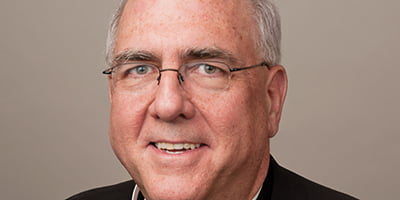by Archbishop Joseph F. Naumann
The Sept. 19 edition of The Leaven featured four videos that can be viewed on the Kansas Catholic Conference website at: www.kscathconf.org.
Each of the four Kansas diocesan bishops addresses one of the significant moral issues that should be important to Catholics as they cast their votes in the November general elections.
The Catholic Church in the United States has chosen throughout our nation’s history not to engage in partisan politics, not to endorse or support a particular party or particular candidates. However, the church has felt a responsibility to help form the consciences of its people, providing Catholics with the principles and the moral analysis of issues that should help to guide the choices they make as they cast their votes.
As Catholics in a democratic society, we have a responsibility to be engaged and active citizens. Catholics not only have a responsibility to vote but to be informed voters. If you have not educated yourself about the issues and the position of candidates, then it is better not to vote.
Some people speak about a “wall of separation between church and state,” as if this is part of our Constitution. This phrase was coined by Thomas Jefferson in a letter he wrote to the leaders of the Danbury Baptist Church. Actually, the Constitution protects churches from government intrusion into internal church affairs. On the other hand, the Constitution places no limitation on religious leaders speaking about legislative issues, nor does it even prohibit them from endorsing political candidates.
What confuses many people on this issue are the Internal Revenue Services’ restrictions about the activities of tax-exempt organizations. If a church desires tax-exempt status so that its members can claim a tax deduction for their contributions to the church, then it must comply with the IRS regulations.
The IRS prohibits tax exempt entities from endorsing or otherwise supporting particular candidates or parties. This has not presented a problem for the Catholic Church because it actually mirrors our own internal policy adopted long before the IRS came into existence. The IRS does not restrict churches or their leaders from speaking about public policy issues.
For the church to speak about the moral issues involved with abortion, religious liberty, the defense of marriage, capital punishment, immigration, racial discrimination, war, poverty, etc., does not violate IRS regulations. Moreover, if the IRS did try to prohibit the speech of the church and its leaders in these areas, then we would be obligated to give up our tax-exempt status rather than allow ourselves to be silenced on these moral issues.
With the general elections just a month away, I encourage every member of the archdiocese to take the time to view the videos and reflect on their messages as part of your preparation to vote. Each bishop addresses a different issue of moral significance.
I speak about the societal and moral implications resulting from a redefinition of marriage. Bishop Brungardt of Dodge City addresses the societal responsibility to protect innocent human life. Bishop Weisenburger of Salina tackles the issue of helping and protecting the poor by focusing specifically on the need to regulate the payday loan industry. Bishop Kemme of Wichita addresses the current threats to religious liberty and the need to protect conscience rights.
The Kansas bishops do not claim that these are the only relevant issues to be considered, but we do believe that these are among those of greatest moral importance. It intrigues me that the church has been criticized in some quarters for focusing too much on so-called social issues. Some have accused us pejoratively of attempting to make Catholics into single-issue voters.
Yet, those who wield that criticism are actually often “guilty” of it themselves. For instance, in my memory the paper of record in the Kansas City metropolitan area (The Kansas City Star) has never in the 10 years I have been in Kansas endorsed a pro-life candidate, except when both candidates in a particular race have been pro-life. Moreover, if a candidate does not conform to the Star’s editorial social agenda, which includes support for legalized abortion, the redefinition of marriage, and the coercion of the church and individuals by the government to violate their consciences in providing morally objectionable “services” in health care plans, they can expect harsh treatment not only on the editorial page, but also in the news section.
While I completely disagree with the Star’s positions supporting abortion, the redefinition of marriage, and diminishing religious liberty and conscience rights, I do agree that these are the key issues for our culture and nation. If the Star can make conformity with its editorial stance on these social issues a litmus test for its endorsement, why should people of faith not disqualify giving their vote to candidates who support abortion, the redefinition of marriage, and attacks on religious liberty? Think about it.
In a democracy we get the government we deserve. A democratic republic can only endure if it has virtuous and well-informed citizens who select individuals for public office that work for public policies that uphold the sanctity of human life, support marriage and family, guard religious liberty and conscience rights, and protect and empower the poor.
Each of the videos is approximately eight minutes in length. I encourage you to take the time in the coming weeks to view them and reflect on the information. Then find out about the positions of the candidates for whom you will be casting your vote and do not depend solely on secular news sources in your evaluation. If we are concerned about the direction of our nation and culture, then we must choose wisely those we place in positions of power and authority.
We can help to change the culture one vote, one election at a time.



